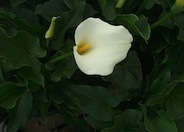
Common name:Blue Blossom Ceanothus
Botanical name:Ceanothus thyrsiflorus 'Skylark'
The blue blossom ceanothus is a shrub that has dark blue flower clusters that bloom profusely . This smaller growing selection grows to 6' H x 4-6' W. This shrub attracts butterflies, hummingbirds and beneficial insects. Its native counterpart
can be found from sea level to 1500 ft. elevations in mixed evergreen and redwood forests of the Coast Ranges. -Cornflower Farms (edited)

Common name:California Poppy, Golden Poppy
Botanical name:Eschscholzia californica
This small annual (sometimes acts as a perennial) plant will grow to less than 1' tall and has light, small blue/green leaves with gold and orange flowers that bloom in spring and summer.

Common name:Common Blue Fescue, Blue Fescuegras
Botanical name:Festuca glauca
This groundcover/grass will grow less than 1' tall and has small, blue-green leaves.

Common name:Dr. Hurd Manzanita
Botanical name:Arctostaphylos manzanita 'Dr. Hurd'
This is a large shrub with showy bark that reaches 8'-20' tall and wide. It has dark red bark, large pale green leaves and white to pink flower clusters that bloom from February to March.

Common name:Calla Lilly
Botanical name:Zantedeschia aethiopica
This perennial will grow 2-4' tall and has large, glossy green leaves with beautiful cream or white flowers that bloom in spring and sometimes even summer.
In the natural world the endless cycle of birth, growth, decay, death and rebirth flows throughout the seasons. Plants die, leaves fall and new growth springs up in its place. Nothing is lost and the fallen leaves and dead plants decay into the soil, enriching it for the next generation of growth.
Click in the green box for more information
Designer:
Photographer: GardenSoft
Maintain a two to four inch layer of mulch on the soil surface to reduce weeds, infiltrate rain water, and reduce compaction.
Develop healthy soil for plants that are vigorous and naturally pest-resistant.